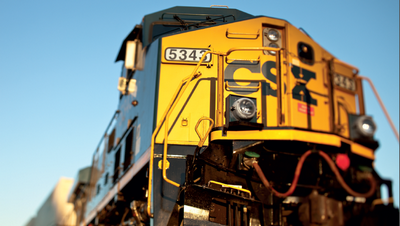Overnight delivery by air may be quick, but the majority of U.S. goods will likely be shipped by ground — by rail and road — for the foreseeable future, industry experts say.
And as far as those two methods of freight transport are concerned, there is some indication that railroad operators will fare well in the coming years, as companies look for greener and more efficient ways to move their products.
Keith Schoonmaker, an analyst with Chicago-based Morningstar Inc., said more companies want to show clients and investors how they’re reducing their carbon footprint, an indication that green business practices are becoming important to all businesses. That’s one reason Schoonmaker, who covers CSX Corp., believes rail has gained popularity as a freight shipment mode.
Cleaner, Lower-Cost Alternative?
“Railroad has that, plus lower costs, and with all those things, it’s a win,” Schoonmaker said.
CSX, the major railroad operator for the Northeast that has operations in Worcester and Westborough, was among six top, or “Class I,” U.S. railroads that had Economic Moat ratings — an indicator of strong margins — that improved from “narrow” to “wide” by Morningstar in July, based on the expectation that CSX will continue to improve operating ratios and produce greater returns for investors.
CSX’s third-quarter earnings, released Oct. 16, speak to Morningstar’s confidence in the company. Revenue improved to $2.99 billion in the third quarter, compared to $2.89 billion in 2012. For the year, revenue totaled $9.02 billion, up from $8.87 billion in 2012.
The company’s operating ratio improved to 71.5 percent for the quarter, up slightly from 70.5 percent in 2012. For the year, the operating ratio improved a little year over year, to 70.2 percent from 70.1 percent.
Of course, the fact that rail shipment is deemed to be a cleaner shipping method than trucking — which accounts for most U.S. shipments — doesn’t tell the entire story in terms of headway. Gaining Steam
The gains CSX and other railroad operators have made reflect an improved economic picture.
“We’ve had a tremendous recovery in home and building and automobiles, and those parts are hauled by rail,” Schoonmaker said.
He added that railroad companies have a major advantage over trucking firms in the area of efficiency. For one thing, trains can fit more product, and it takes fewer drivers to operate a train than a trucking fleet. And intermodal shipping, which employs a combination of trains and trucks to move freight, is also becoming more popular along the East Coast, which has traditionally been dominated by trucking.
An improving outlook is not unique to CSX. Providence and Worcester Railroad Co., a Worcester-based regional railroad operating in Massachusetts, Connecticut, Rhode Island and New York, posted operating revenue of $8.8 million in the third quarter, up from $7.95 million in 2012. For the year, revenue has grown to $24.5 million, compared to $23 million last year.
Charles Rennick, secretary and general counsel at Providence and Worcester, cited a general improvement in economic conditions behind increased traffic volumes. In an earnings statement, the company said increased stone shipments boosted revenue.
Rennick said in an e-mail that much of that freight is sent by concrete and asphalt plants and construction companies based in Metropolitan New York and Long Island.
Another boost for Providence and Worcester actually came from CSX. Providence and Worcester interchanges traffic with CSX at Worcester, and has benefitted from CSX’s first double-stack route on its rail line between Worcester and the New York border. The route opened in January, and Rennick said it has “enhanced P&W’s intermodal service between the West Coast and the Port of New York and New Jersey by promoting better transit times and lower costs.”
CSX does not break out shipping trends by region, according to company spokesman Gary Sease, so information about how track improvements have contributed to improved business for the company was not available.
No Threat To Trucking
Railroad companies may have a bright future, but will that detract from the success of the trucking business?
While Schoonmaker thinks more companies will consider shipping freight via rail because of its efficiency and cleanliness, Sean McNally, spokesman for the American Trucking Associations, isn’t worried. He said about 80 percent of the total U.S. freight bill, or $642.1 billion, is generated by trucking.
“There are maybe some segments of the rail business that may grow a little bit at the expense of the trucking industry, but that’s because trucking companies themselves are using more rail,” said McNally, who explained that the trucking firms are often contracting with railroads to ship items between points, only to be picked up and delivered by trucks at the end of the line.
The advantage with trucking is obvious, McNally said. Not too many businesses that receive goods have rail spurs at their doorsteps.
“We demand things quickly as a society, and generally trucks are better at that than trains,” McNally said. n
Read more

